Soumya Kundu
Examination of Witnesses by Police: Criminal Cases

Long Delay in Recording: An unexplained long delay in recording the statement of a material witness in a murder case (e.g., a delay of 10 days) will render their evidence unreliable. ...
Police Witness Examination, Legal Rights of the Accused, and Committal Procee...

Examination of Witnesses by Police Any police officer conducting an investigation under this Chapter, or any police officer not below the rank prescribed by the State Government ...
Section 156(3) CrPC: Magistrate Powers and Police Investigations Explained

Criminal Trial and Investigation Investigation by Police Under Section 156(3) of the Criminal Procedure Code (CrPC), a Judicial Magistrate, who is competent to take cognizance under Se...
Testamentary Succession: Legal Rights and Testamentary Laws in India: Key Cas...

Prior to the enactment of the Hindu Succession Act, a coparcener was not entitled to either gift or will his interest in the coparcenary property. This ban or embargo has been removed concernin...
Legal Grounds for Nullity of Marriage and Divorce: A Comprehensive Guide

Nullity of Marriage and Divorce Sec. 12 - Consent to Marriage Obtained by Force or Fraud [Section 12(1)(c)] According to this clause, the marriage is voidable on the ground th...
Hindu Law in Marriage and Divorce: Understanding Restitution of Conjugal Rights

Hindu Law of Marriage and Divorce Restitution of conjugal rights would be refused if the husband is guilty of mental cruelty. It is not necessary for there to be physical assault, violence, or t...
Necessity Of Proof Of Marriage: Guide To Maintenance Laws And Rights

The wife is entitled to receive maintenance from her daughter if the daughter is employed. Therefore, to secure additional financial support for her livelihood, the wife is entitled t...
Widow’s Legal Rights: Maintenance and Property Claims Under Hindu Law

Widow's Right: Limited to Maintenance This right of survivorship, on the other hand, is fully recognized by the Mitakshara as excluding the widow and other heirs in the enumeration ...
Property of a Female Hindu to be her Absolute Property

The Hindu Succession Act made a significant departure from the established norms of Hindu personal law by including the concept of an imperfect title in property acquired by a Hindu female for ...
Right of Heirs: Property Succession and Testamentary Laws in India

Once the testator had divested himself of his entire estate, as he did in the present case by his will, he could not later, by adding a subsequent clause, seek to detract from it by imposing a ...
Special Provision Respecting Dwelling-Houses

Widow having share in the property and right of residence, ousted by other co-sharers is entitled to an injunction in a suit brought by her - Section 23 of the Hindu Succession Act , bestows a ...
Understanding Section 23 of the Hindu Succession Act: Key Judgments and Legal...

Section 23 SYN. No. 3 Special Provision Respecting Dwelling House Section 23 When the deceased leaves behind a single male and female heir:In the case of Arun Kumar Sanyal v. Jnandera Nath Sany...
Protection Of Witnesses Who Are Threatened To Give False Evidence: Best Bakery

Uncover the Role of Courts in Ensuring Justice: Explore the balance between convicting the guilty and protecting the innocent, the powers of Sections 311 CrPC and 165 Evidence Act, and how flawed i...
Legal Complexities: Key Insights into Criminal Procedure, Double Jeopardy, an...

Negotiable Instruments Rule 339 of the Criminal Rules of Practice provides for the issuance of copies to parties. It stipulates that copies of any por...
Presumption under Section 118 and Section 138
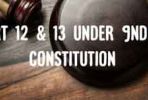
In the case of Ulla v. State, the principle under Section 19 of the Indian Penal Code (IPC) and the provisions of Section 403 of the Code were discussed. Section 118 of the Negotiable Instrumen...
Welfare of Children is the Paramount Consideration

Hindu Minority and Guardianship Act, 1956Under the Guardians and Wards Act , the court has the authority to make orders regarding custody, access, education, and maintenance of a minor. Such orde...
Exceptional Circumstances for Alienation of Joint Family Property: Legal Insi...

Hindu Minority and Guardianship Act, 1956The powers of the Karta , as well as those of the guardian, are said to be based on the following four verses of the Mitakshara . Vijnaneshwara lays down ...
Article 356: Legal Framework, Judicial Review, and Constitutional Safeguards ...

The power to dissolve the Legislative Assembly can be considered implicit in clause (1) of Article 356. It must be held, with regard to the overall constitutional framework, that the President ...
Principles of Hindu Law: Reasonable Limits on Gifts of Ancestral Property by ...

Principles of Hindu LawA Hindu father or another managing member has the power to make a gift, within reasonable limits, of ancestral immovable property for pious purposes. However, such aliena...
Dishonour of cheques: Key Legal Deadlines for Filing Cheque Bounce Complaints

Computation of Period for Filing a Complaint:In a particular case, a cheque was presented for the second time but was returned unpaid. However, a legal notice for demand was not issued within thi...
Comprehensive Guide to Legal Decrees: Understanding Orders, Custody, and Main...

Chapter X - Finding And Decree Details of Decree and Extract from the Decree The decree includes, if necessary, orders for custody, damages, and costs. Where the petition includes a request for...
The Role of Decree in Hindu Law: Marriage Dissolution and Nullity Suits Expla...

Section II. - Decrees. Decree Nisi in Suits for Dissolution or Nullity If a finding is arrived at, the Judge may dismiss the petition or pronounce a substantive decree if the case of the peti...
How Vesting of Estate Works in Wills: Indian Succession Act,1925

(1880) 5 AC 714 HL. 14. Postponement of Vesting. In Sisir v. Ajit AIR 1938 Cal 466:42, it was held that upon the death of the testator, the estate vested in the son, and the vesting was not po...
Article 21's Impact on Death Penalty Law in India

Landmark Judgments: Article 21 clearly highlights the Founding Fathers' recognition of the State's right to deprive a person of life and personal liberty, provided it is done in accordance wit...
Maintenance Laws in India: Section 125 CrPC and the Hindu Marriage Act Explained

Multiple Orders The order passed by the learned Magistrate regarding maintenance under Section 125 of the Criminal Procedure Code shall be kept in abeyance as long as the wife receives alimony...
Maintenance Rights in Void Marriages: Legal Perspectives and Implications Und...

Wife from Void Marriage:It is undoubtedly true that the Maintenance Act is a beneficial piece of legislation conferring additional rights on women and children. However, it cannot be interprete...
Understanding Interlocutory Orders and Revisional Jurisdiction in Indian Crim...

Reference And RevisionThe term "interlocutory order" was explained in light of the Apex Court's verdict in Amarnath v. State of Haryana. The term "interlocutory order" in Se...
Indian Succession Act, 1925: Key Legal Principles and Case Law

Applicability: This section, Section 57, Schedule III, applies to the wills of Hindus. Scope: The effect and scope of this section is that when a bequest is immediate but payment is postpone...
Sale of Joint Hindu Family Property

The Recitals of Legal Necessity in the Sale Deed and Its Effect: Legal necessity to support a sale must be established by the transferee. The onus of proving legal necessity may be discharged by...
Understanding Joint Wills and Mutual Wills: Legal Principles, Doctrines, and ...

Section 62 - Joint Wills Persons may create joint wills, which, however, are revocable at any time by either of them or by the survivor. A joint will is regarded as the will of each testator ...
Intention of the Testator:: Key Legal Principles and Landmark Judgments on Wi...

Intention of the Testator: In construing a will, the intention of the testator is to be given effect as far as practicable. Therefore, if the court finds that the entire intention of the testat...
Valid Adoption can't be cancelled: Legal Framework and Implications of Adopti...

A valid adoption cannot be cancelled. Adoption is not a matter of contract but a matter of status. Once an adoption is validly made, it cannot be cancelled by any of the parties involved. The e...
Persons Capable Of Giving Adoption: The Role of Guardians and Religious Consi...
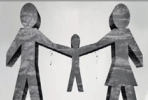
Competence of Giving Adoption: This section confers the competence to give a child in adoption only to certain persons, namely the father, the mother, and the guardian of the child to be given...
Maintenance Laws in India: An In-Depth Look at Section 125 of the CrPC

In a proceeding under Section 125 of the Criminal Procedure Code (CrPC), the court does not determine the status of the parties, nor does it issue any findings that have the value of res judica...
Understanding Legal Rights: Property of a Female Hindu

The entire coparcenary property could not be given in maintenance to the widow. In the absence of any pleadings indicating that Balwant Rao Shinde had given the properties to Chhabu Bai as m...
Indian Succession Act

6. Civil suit by legattee. Whether maintainable against Administrator The scope and ambit of sec. 141 fell for consideration on the factual matrix of Himanshu v Sudhansu 2004(1) CHN 626. The...
Genuiness Of A Will

Where a will, alleged to have been executed by the propounder's sister, was duly attested by witnesses, and no objection affidavit was filed by one of the contesting brothers-who also admitted ...
Indian Succession Act, 1925: Key Principles, Case Laws, and Applications

This section is comparable to Section 27 of the Transfer of Property Act, which embodies the principle of acceleration. Ordinarily speaking, acceleration means that the time for vesting in poss...
Comprehensive Guide to Key Legal Principles and Landmark Case Laws: Gift to H...

Indian Succession Act, 1925Section 95:The Privy Council observed as far back as in the case of Md. Samsul Huda vs Suratram (1874) 2 IA 4 p.14 that, in construing the will of a Hindu, it is not ...
Faults of Divorce

Mental Cruelty: Intention is not required to prove mental cruelty. The act of depriving a husband of his conjugal rights by a wife is considered the worst form of cruelty a wife can inflict, a...
Decree of Divorce During Restitution of Conjugal Rights: Legal Insights on Ir...

A decree of divorce passed during the pendency of a husband's application for restitution of conjugal rights is not invalid, considering the facts and circumstances where all efforts for reconc...
Understanding Section 109 of the Succession Act: When a Legacy Does Not Lapse...

Succession Act:When legacy does not lapse: When legatee himself is the lineal descendant of the testator, and predeceases the testator, leaving a lineal descendant who survives the testator, le...
Documents as original: The Importance of Certified Copies in Legal Evidence a...

When the original is a document for which a certified copy is permitted by law to be given in evidence, a certified copy is the only admissible evidence. The phrase "to be given in evidenc...
Constituents of Res Gestae
The res festae be defined as those circumstances which are the automatic and undesigned incidents of a particular litigated act and which are admissible when illustrative of such act. These inciden...
Witness Cross Examination

Witness Whether Must be Cross-examinedUnder the Act, cross-examination of a witness is not essential. The coun is not precluded from assessing the veracity of a witness in the absence of any cros...
Wound Certificate: Post-Mortem
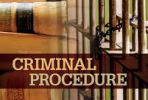
Wound Certificate:The wound certificate is a copy of the entries in the accident register and the opinion of the doctor regarding the nature of the injuries and their probable cause. It is admi...
Meaning of Precepts

Section 46 governs only the attachment in the execution of a decree and does not come into play in the context of Order 38 Rule 5 or Order 21 Rule 46 [Chimandas v. Mahadevappa Firm, A 1961 AP 4...
Injured Witness

Delay in FIR:There is no dispute with regard to the legal proposition in case the accused is able to indicate from the evidence on the record that the recording of the FIR has been delayed or t...
Inconsistent gifts

Inconsistent GiftsBefore applying the provisions of this section, the court must make every effort to reconcile the apparent gifts. Only if this attempt fails, and it is not possible to give ef...
Weekend Marriage: Wife's Refusal To Give Up The Job: Withdrawal From The Society

Restitution of Conjugal Rights A question that has come before the Punjab High Court in Tirath Kaur v. Kirpal Singh involved a husband's petition for restitution of conjugal rights on the aver...
Law of Marriage and Divorce

In Chand Dhawan v. Jawaharlal Dhawan, concerning permanent maintenance and alimony, Punchhi, J., posed the question: "Is the payment of alimony admissible without the relationship between ...
Hindu Law Explained: Rights of Wives in Separation Agreements and Judicial Se...

Separation Agreements and Judicial Separation: Under Shastric Hindu Law, a wife was allowed to live separately from her husband under certain exceptional circumstances and still claim maintenance....
Understanding Partition of Property Under Indian Succession Law: Key Legal Pr...

Partition of Dwelling Houses: A will, like any other document, is to be proved in terms of the provisions of Section 68 of the Indian Succession Act and the Evidence Act. The propounder of the...
Understanding Lis Pendens: Legal Implications of Property Transactions During...

The effect of Section 52 is not to wipe out a sale pendente lite altogether. It only operates as a bar to the extent of the right, title, and interest that may be determined in favor of the oth...
Hostile Witness Can't Escape Punishment Every By Negative Support

It is not merely a matter of the provisions of law as contained in sections 145 and 157 of the Evidence Act or the proviso to subsection (1) of section 162 of the CrPC; the question posed is of...
Failure To Cross Examine Solitary Witness

The failure of the respondents to cross examine solitary witness or confront him with their version, despite adequate opportunity must lead to an inference of tacit admission on their part. T...
Production Of Additional Evidence

The rule does not state that if a petition is not subsequently filed by the plaintiff for permission to be examined as a witness, the Court has the power to entertain or allow such a prayer. If...
Understanding the Legal Framework for Document Production and Privilege Claim...

Production of Document: A person may be summoned to produce a document under Order XVI, Rule 6 of the CPC, and Section 162 of the Indian Evidence Act, 1872. It is thus evident that, firstly, ...
Panch Witness And Search Witness

Panch Witness is Not an Independent WitnessThe panch witness is not an independent witness. He displayed a partisan attitude towards the police, was under their influence, and therefore signed th...
Examination of Accused's lawyer: : Key Case Laws, Sections, and Examination U...

The general rule is that the accused must answer questions by being personally present in court. Only in exceptional circumstances can this rule be departed from or dispensed with, as held in K...
Desertion in Divorce Law: Factum, Animus Deserendi, and Key Court Rulings

For the act of desertion, there must be Factum or physical separation and Animus Deserendi, which is the intention to end cohabitation permanently. Both essential elements must persist througho...
Legal Grounds for Prohibited Marriages Under Muslim Law: Consanguinity, Affin...

Grounds on which marriage is prohibited: Prohibition on the ground of Consanguinity his mother or his grandmother how high so ever. his daughter or his granddaughter how lo so ever. ...
Maintenance Of Wife And Children Under The Code Of Criminal Procedure

Section 125 of the Criminal Procedure Code, 1973, provides that if any person having sufficient means neglects or refuses to maintain his wife or his legitimate child who is unable to maintain ...
Understanding Child Custody Laws: Key Legal Principles and Court Jurisdiction

An order may be made even if the children are outside the jurisdiction of the court. It is the court where the child normally resides that will have jurisdiction to entertain an application for...
Divorce by Mutual consent

Physical Separation:The typical case of physical separation occurs when both spouses have established separate households in two different locations. However, in modern city life, it often happ...
Introduction of Criminal Laws 2023

The offense of a 'Terrorist Act' is now explicitly defined as a distinct criminal offense under the Bharatiya Nyaya Sanhita (BNS). This definition encompasses actions that threaten India's unit...
Meaning Of Accessory And Connivance

"Accessory" and "Connivance" are of the same quality. The distinction between the two is that in the former, there is active participation by the petitioner in the responden...
When Accused Can Be Discharged

An accused shall be discharged after all the evidence referred to in Section 269 of the Bharatiya Nagarik Suraksha Sanhita, 2023, has been taken. If, after considering all the evidence referred...
Governor's powers under Article 161 Constitution

Pardon is one of the many prerogatives that have been recognized since time immemorial as being vested in the sovereign, regardless of where sovereignty might lie. Whether the sovereign is an a...
How Legal Definitions of Disease Impact Healthcare and Legal Rights: An In-De...

Disease is any disturbance in the structure or function of the body or any of its parts, an imbalance between the individual and their environment, or a lack of perfect health. The problem with...
The Intersection of Law and Ethics: How Legal Standards and Moral Judgments D...

The connection between medical law and medical ethics is revealing. It might be thought that the two would be closely linked. After all, courts would be unlikely to make an order that requires ...
Medical Ethics: The Intersection of Law and Medicine-How Legal Challenges Are...

Medical law encompasses elements from various branches of law, including criminal law, human rights law, tort law, contract law, property law, family law, and public law. One commentator has su...
What is Medical Law

A Secretary of State for Health once said, "The only place for a lawyer in the NHS [National Health Service] is on the operating table." This is wishful thinking. If medicine were pra...
How Technology is Revolutionizing Medical Law: Insights into Patient Rights a...

Medical law is undergoing transformation. Rapid scientific advances mean that lawyers and ethicists are constantly confronted with new issues. More significantly, our attitude towards our healt...
Cardinal Principles of Interpretation

It is a cardinal principle of statutory interpretation, as observed by the Supreme Court in the case of Shri Ram v. State of Maharashtra, that where the language of an Act is clear and explicit...
Understanding the Legal Standards for Conviction Based on Circumstantial Evid...

In State of Rajasthan v. Rajaram, it has been held in paragraph 16 as follows: A reference may be made to a later decision in Sharad Birdhichand Sarda v. State of Maharashtra. There, while deal...
Understanding Section 498A IPC: Legal Insights on Cruelty and Dowry Harassment

Substantive Section 498A of the IPC and presumptive Section 113B of the Indian Evidence Act, 1872, were inserted into the respective statutes by the Criminal Law (Second Amendment) Act, 1983, a...
Object of Criminal Trial

The object of a criminal trial is to mete out justice, convict the guilty, and protect the innocent. Therefore, the trial should be a search for the truth, not about overemphasis on technicalit...
Right to life: Understanding the Legal Framework of Euthanasia and Patient Ri...

The Constitution Bench of the Supreme Court in Gian Kaur's case held that the right to life, including the right to live with human dignity, encompasses the existence of such a right up to the ...
Wagering Contract: How to Protect Your Rights

When a promissory note is expected for payment of a debt arising out of a wagering contract or transaction, it is affected by Section 30 of the Indian Contract Act and cannot be enforced. Howev...
Understanding the Legal Impact of Omission or Error in Framing Charges: Insig...

The omission to frame a charge, the absence of a charge, or an error in the charge itself cannot vitiate the trial. The apex court, in State v. Thakkidiram (AIR 1998 SC 2702), explained the und...
Understanding the Power of Sentence Commutation: A Guide to Section 433 of CrPC

Section 433 of the CrPC pertains to the power of the government to commute a sentence without the consent of the person sentenced. When the appropriate government commutes a sentence, it does ...
Jurisdiction Of Court For Filling Petition For Execution Of The Award
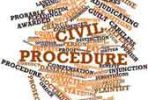
Although filing of awards in courts is no longer required under the 1996 Act, these cases may help determine the award under section 36. In Bijoy Das v UOI (1993) Arb LR 142, it was established ...
Factors To Be Considered In Fixing Compensation Under Sub-Section(3)

The need for awarding compensation has been considered by Justice Shetty in the case of Hari Singh v. Sukhbir Singh (1984) 4 SCC 551. Although subsection (3) should be exercised liberally, the ...
Provisions of Section 320

It is undoubtedly true that Section 147 of the Negotiable Instrument Act renders an offense under Section 138 of the same Act compoundable. However, to make an offense compoundable, the mode an...
Infirmities In Prosecution Story

A case of dacoity was committed at the residence of Ram Gopal, and two constables were sent to protect his family members and his property. However, Ram Gopal himself has not been examined, whi...
Contradictions and Omissions in Legal Testimonies: Insights from Tahstidar Si...

Contradiction means the setting of one statement against another and not the setting up of a statement against nothing. As noted in Tahstidar Singh vs. State of U.P. AIR 1959 SC 1012, all omiss...
Inherent Jurisdiction under Section 482 CrPC: Quashing Proceedings to Prevent...

The inherent jurisdiction of Section 482 of the Code of Criminal Procedure (CrPC) can be exercised to quash proceedings in an appropriate case, either to prevent the abuse of the court process ...
Understanding Telephonic Information and Its Legal Implications: FIR and Sect...

A telephonic information received at the police station need not, in all circumstances, be deemed to be the First Information. When no formal investigation is commenced upon such information, i...
Use Of Identification Parade
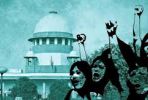
The holding of a test identification process is as much in the interest of the investigation agency or the prosecution as it is in the interest of the suspect or the accused. For a while, it en...
Object Of Questioning: The Role of Section 313 CrPC in Protecting Accused Rig...

Section 313 of the CrPC prescribes a procedural safeguard for an accused facing trial, granting them the opportunity to explain the facts and circumstances appearing against them in the prosecu...
Factors that influencing sentencing

A proper sentence is a composite of many factors, including the nature of the offense, the extenuating or aggravating circumstances related to the offense, the prior criminal record (if any) of...
Quality of Evidence necessary for imposition of death sentence

In some cases, evidence unerringly proves the participation of all accused persons when their number exceeds one in the commission of an offense. However, this evidence may fail to indicate the...
Empowering Justice: The Role and Impact of Public Interest Litigation in Adva...

The strategy of Public Interest Litigation (PIL) has been developed to bring justice within easy reach of the poor and disadvantaged sections of the community. The grievances in a PIL action co...
Meaning of Appeal

Although the term "appeal" is used in both the Code of Criminal Procedure and the Code of Civil Procedure, as well as in many other statutes, it has not been explicitly defined anywhere. Generally,...
Consideration Regarding Grant Of Bail Applies

In a case where a judgment of conviction has been awarded, the court can release a person on bail, considering not only the nature of the offense but also other relevant factors, including its ...
Prospective Overruling: Its Evolution, Application, and Impact on Constitutio...

Prospective overruling is now well settled and widely accepted as part of constitutional interpretation. It can be invoked by the Supreme Court when succeeding the law declared by it earlier. T...
Section 342 Contemplates Examination in Court and Deprecates the Practice of ...

The privilege and duty of answering questions under Section 313 cannot be delegated to a pleader. However, the Code of Criminal Procedure (Amendment) Act, 2008 (Act of 5, 2009) has introduced ...
Object of 313 Crpc

Section 313 of the Code of Criminal Procedure (CrPC) prescribes a procedural safeguard for an accused facing trial, granting them an opportunity to explain the facts and circumstances presented...
Questioning u/s 313 (1) (b) Mandatory

The question in Section 313(1)(b) is mandatory. It imposes a heavy duty upon the court to exercise greater care in ensuring that the incriminating circumstances are put to the accused and that ...
Popular Articles by Soumya Kundu
Desertion in Divorce Law: Factum, Animus...

For the act of desertion, there must be Factum or physical separation and Animus Deserendi, whi...
Understanding Lis Pendens: Legal Implica...

The effect of Section 52 is not to wipe out a sale pendente lite altogether. It only operates a...
Wagering Contract: How to Protect Your R...

When a promissory note is expected for payment of a debt arising out of a wagering contract or ...
Contradictions and Omissions in Legal Te...

Contradiction means the setting of one statement against another and not the setting up of a st...

